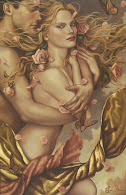Let me hold you
For the last time
It's the last chance to feel again
But you broke me
Now I can't feel anything
When I love you
It's so untrue
I can't even convince myself
When I'm speaking
It's the voice of someone else
Oh it tears me up
I tried to hold but it hurts too much
I tried to forgive but it's not enough
To make it all okay
You can't play our broken strings
You can't feel anything
That your heart don't want to feel
I can't tell you something that aint real
Oh the truth hurts
And lies worse
I can't like it anymore
And I love you a little less than before
Oh what are we doing
We are turning into dust
Playing house in the ruins of us
Running back through the fire
When there's nothing left to say
It's like chasing the very last train
When it's too late
Oh it tears me up
I tried to hold but it hurts too much
I tried to forgive but it's not enough
To make it all okay
You can't play our broken strings
You can't feel anything
That your heart don't want to feel
I can't tell you something that aint real
Oh the truth hurts
And lies worse
I can't like it anymore
And I love you a little less than before
But we're running through the fire
When there's nothing left to say
It's like chasing the very last train
When we both know it's too late
You can't play our broken strings
You can't feel anything
That your heart don't want to feel
I can't tell you something that aint real
Oh the truth hurts
And lies worse
I can't like it anymore
And I love you a little less than before
Oh and I love you a little less than before
Let me hold you for the last time
It's the last change to feel again
.jpg)





2 comentários:
Oh so sorry too erase you dear anonymous, but we don´t allow here offensive words.
Now, The "Elfs" or "Elves" word:
The English word elf is from the Old English ælf or elf, themselves from the Proto-Germanic *albiz which also spawned the Old Norse álfr, Middle High German elbe. *Albiz may be from the Proto-Indo-European root *albh- meaning "white", from which also stems the Latin albus "white".[1][2] Alternatively, a connection to the Rbhus, semi-divine craftsmen in Indian mythology, has also been suggested(OED). Originally ælf/elf and it's plural ælfe were the masculine forms, while the corresponding feminine form (first found in eighth century glosses) was ælfen or elfen (with a possible feminine plural -ælfa, found in dunælfa) which became the Middle English elven, using the feminine suffix -en from the earlier -inn which derives from the Proto-Germanic *-innja).[3] The fact that cognates exist (such as the German elbinne) could suggest a West Germanic *alb(i)innjo, however other research disagrees with this view, and argues that the examples are simply a transference to the weak declension common in in Southern and Western forms of Middle English. The Middle English forms with this weak declension were aluen(e) and eluen(e). [4] Thus suggesting that the potential cognates of ælfen may be independent formations, -injo being used throughout the history of Mainland European West Germanic. By the earlier eleventh century ælf could denote a female.[5]
Learn more before saying rubbish!
http://en.wikipedia.org/wiki/Elf
Another clue....
Following J. R. R. Tolkien's influential The Lord of the Rings, wherein a wise, immortal people named Elves have a significant role, elves became staple characters of modern fantasy. But this is an "invented" word.
You'd better try other things besides fantasy literature. It's really nice and entretaining but theres a big world out there my friend :)
Post a Comment